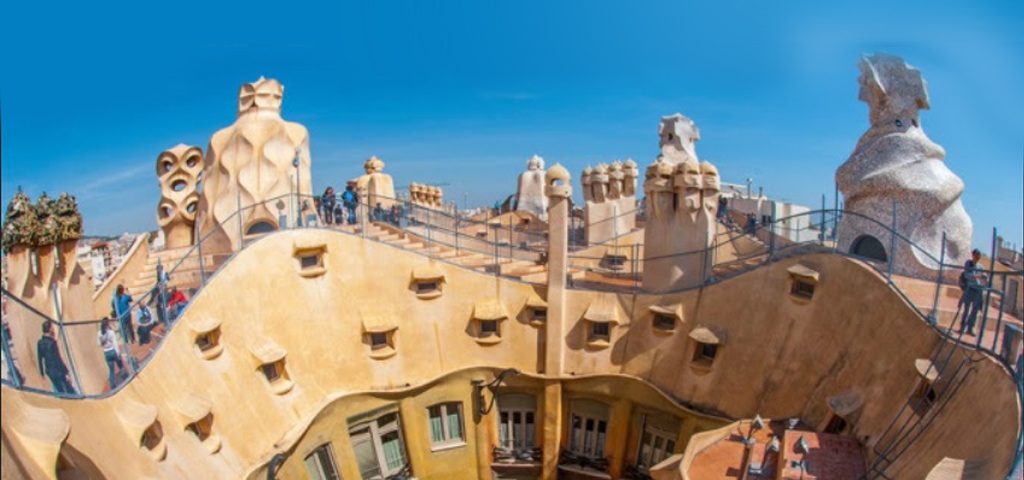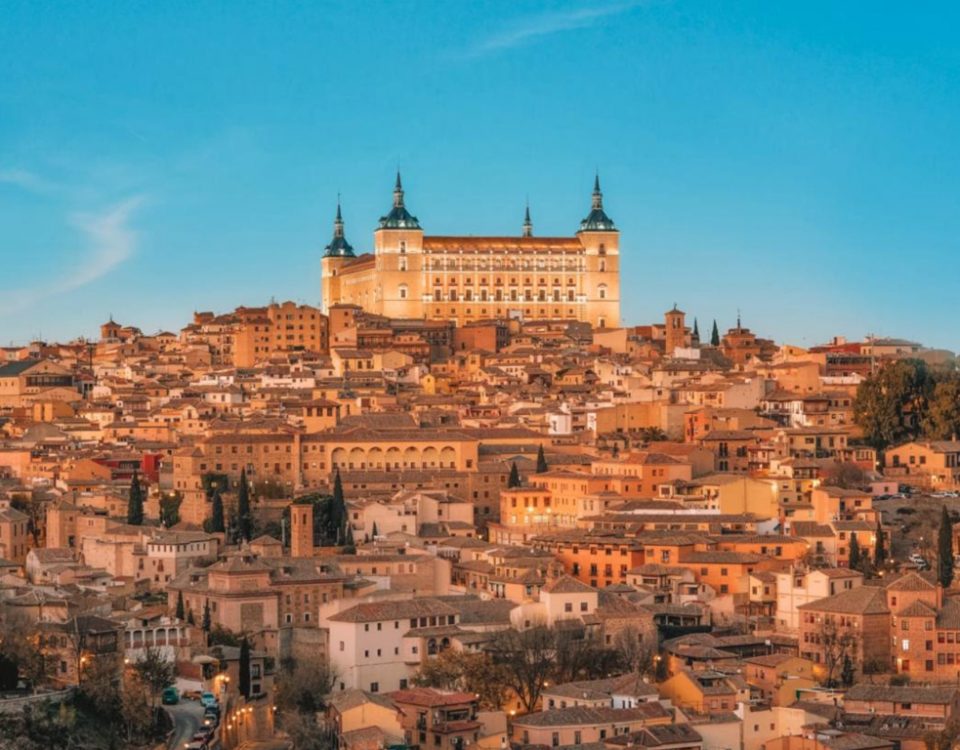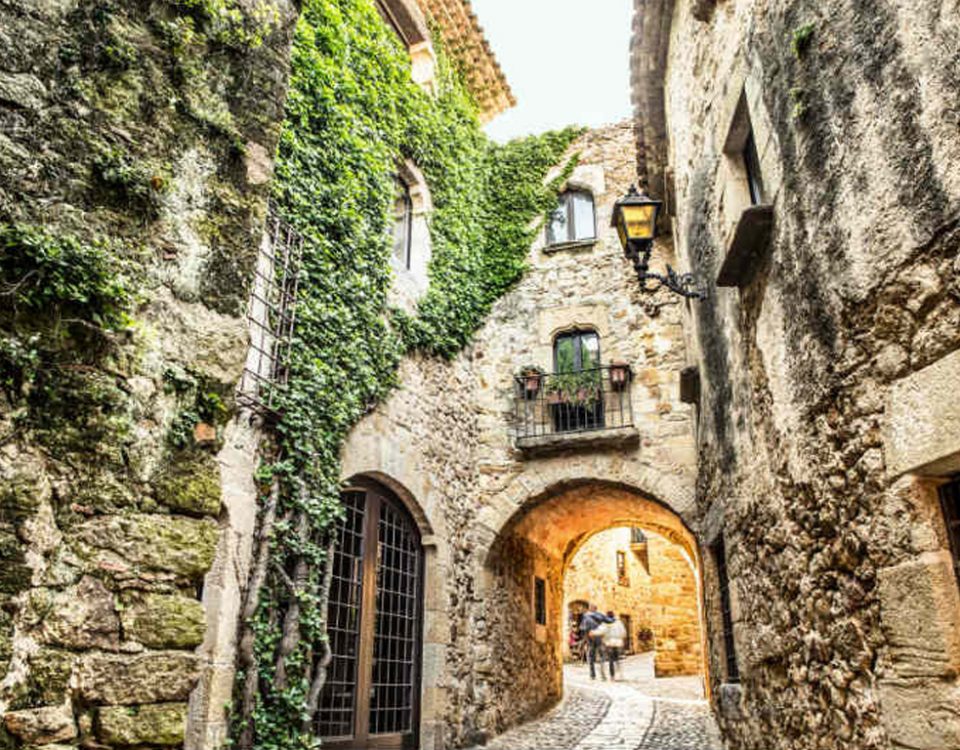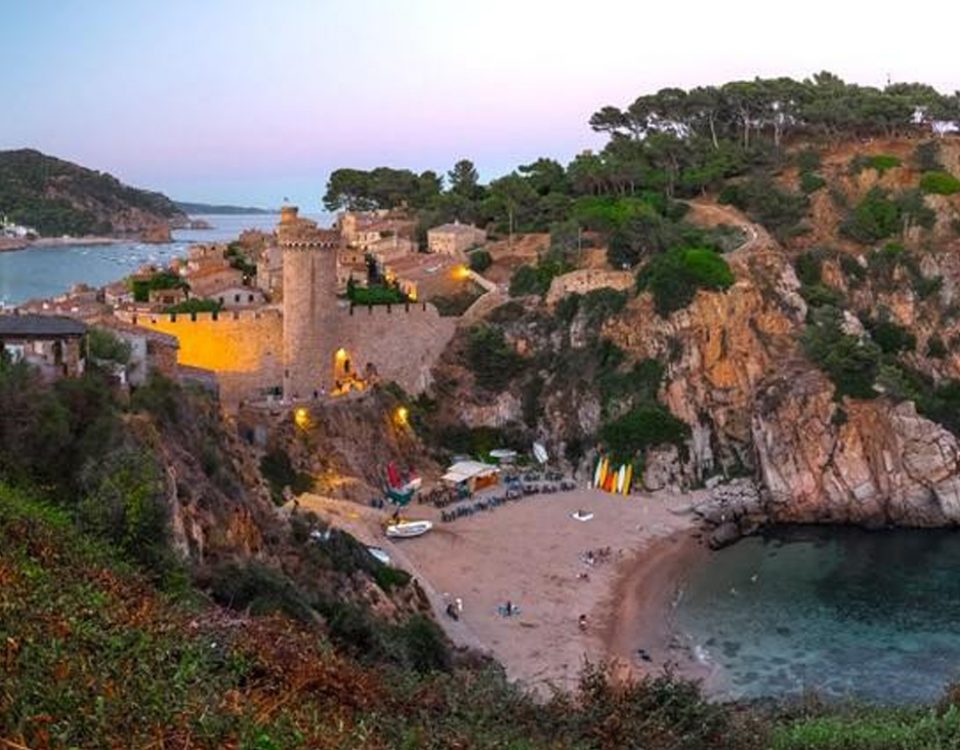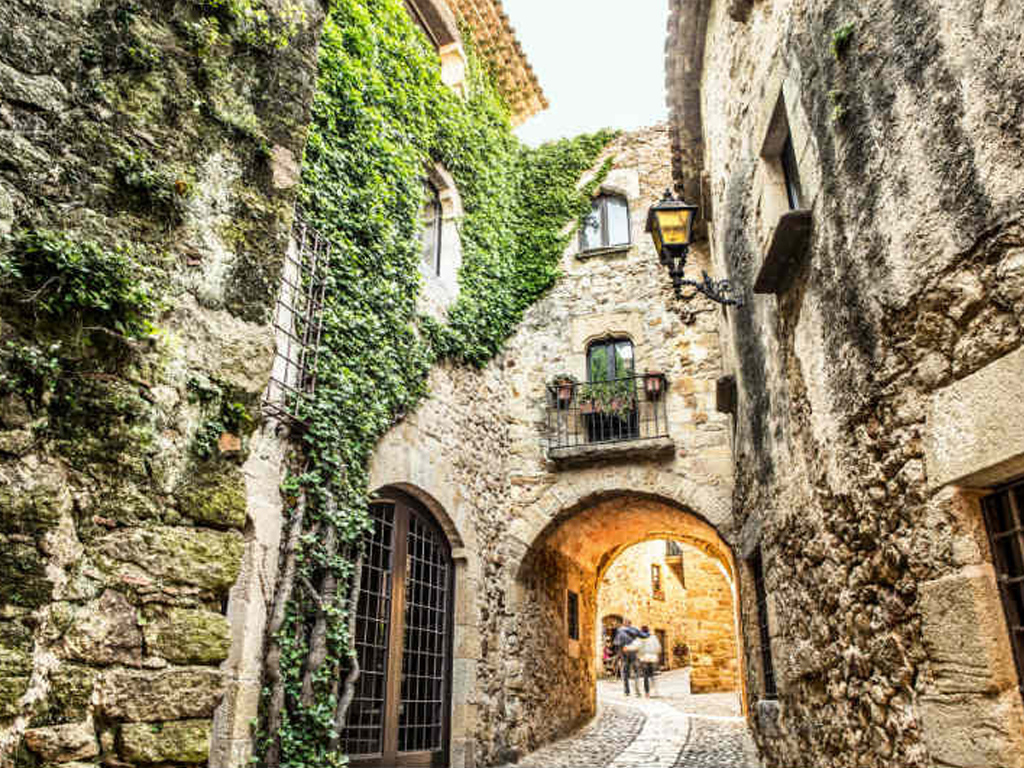
Pals
September 22, 2020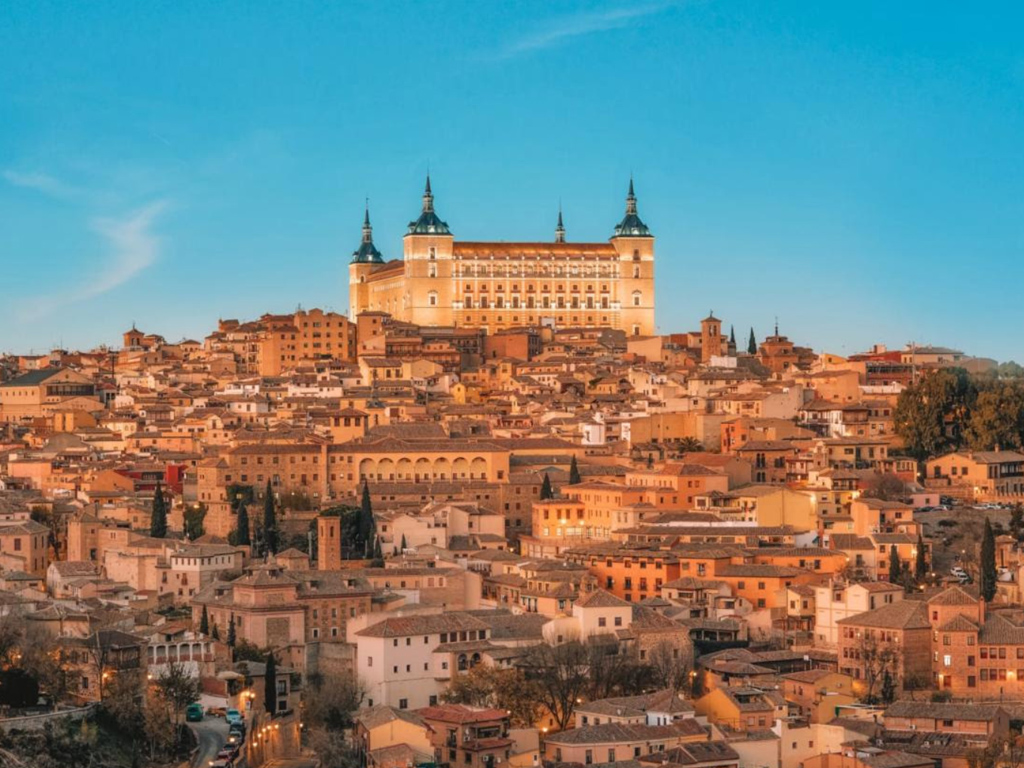
Toledo
October 19, 2020A surreal arrival at Barcelona - El Prat foreshadowed the Dalian nature of this country. As we touched down, we observed no planes departing. Gasoline trucks, baggage trailers, planes were stationery, eerily suspended on the ground. Taxiing in the ground crew guiding us in were ghosts of early morning mist. The plane took five tries to line up with the Gate. Baggage handlers were nowhere - no human presence was to be seen. Grateful to disembark at a Gate as opposed to on an airline parking lot without guidance from the control tower, we trotted in line uncertainly to border control and baggage. Processed by two border control officers we fell into the terminal cavernous without airport workers and passengers to fill it. Restaurants, coffee bars, all shops were closed. Greeters and transportation valets were non-existent. A mere five flights were arriving throughout the day from other international destinations around the world, including Toronto, according to the airport flight information display schedule. With one ground crew person loading baggage, it took an hour and a half for our baggage to arrive on the carousel. Only one Foreign Exchange Office was open. The exit doors opened and closed to reveal a pod of around seventy exhausted people camped on suitcases in a transportation zone, no vehicle in sight. We gingerly asked the attendant how we could get to Barcelona, only thirteen kilometres away. By subway we asked? ”You can take that chance”, the Foreign Exchange Officer replied, “but if any are running, it may stop and not continue, stranding you underground”. “Today there are skeleton services. No buses, drivers, or taxis are allowed in the airport for we are under a General Strike.”
This is the second Catalan General Strike since the Catalan Referendum on independence held October 1, 2017. Seven hundred thousand Catalans marched into the city then blocking roads, halting the transportation systems and closing the airport. Though tensions were high, over three days of pro-independence protests, there were few incidents of violence.
Feeling forsaken, with only one day to enjoy Barcelona before meeting haven guests back at El Prat at 10am the next morning for our drive to our medieval haven, I notice a well-dressed man, not quite middle-aged, approaching me. “Madam, would you like to go to Barcelona”, he asks? “I am your driver. Trust me I will get you there safely.” I’ve travelled much on my own and have had to trust my gut often. My spidey senses echoed in my brain “your safe, go with him”. He led me to his car, the only car parked out front of the airport, alarming on its own, a large, relatively new, black Audi. “Please”, he said politely, “sit upfront with me so I do not look like a driver. Drivers are not permitted into the airport.” Easily, I complied. The interior was clean, fresh, his demeanor comforting, un-threatening. Upon closing the door, I looked around. There was no evidence he was an employed driver anywhere, no employee number for reference or phone number to call. He pulled up to a security gate, showed the attendant a pass and handed him a five euro bill; we were on our way. Driving past the highway exit to Barcelona, there was a massive blockade, manned by the Civil Guardia, preventing around two thousand pro-independence movement Catalonians from occupying the airport. I was slightly alarmed…how are we going to enter Barcelona? Sensing my discomfort, my driver said “Do not worry madam. I will get you to your destination. I know which exits and roads are open and which are not. My name is Faisal. It’s a pleasure to meet you. Where is your hotel? “Faisal and I exchanged pleasantries and shared personal histories on our drive. He was from Tajikstan, trained as an engineer, spoke four languages and had two daughters in university. Though he missed the exotic terrain of his home, he loved his life, his network of friends and Barcelona and was very proud of his family. His daughters identify as Barcelonians first, then Spaniards, and have no desire to see his homeland, he stated with a subtle hint of sadness. My hotel was located a few blocks west off the Passeig de Gràcia, one of the longest, widest and certainly the most glamorous boulevard in Barcelona, home of Manolo Blanik, Louis Vuitton and Chanel, five star luxury hotels and spectacular cafes lined like mosaic tiles along the boulevard. The Gaudi apartments were about five blocks away and Sagrada Familia Cathedral a fifteen minute drive. I planned on taking in a Flamenco performance at the Palau de la Musica Catalana, a music hall and museum housing five-hundred musical instruments from around the world, said to look like the interior of a Faberge egg, steps from my hotel.
Faisal, as promised, navigated smaller open highways to the top of the city and then entered from the north. The outskirts of Barcelona were tinged with an industrial feel, lined with white apartments and white factories. I learned later sixty-five percent of Spaniards live in apartments, the largest European population to do so. They are also the largest population in Europe to own their residences, eighty three per cent. Descending into the city the atmosphere changed. Streets became avenues hemmed with handshaking dark green Monterey Cypress limbs and marbly grey-green camouflage patterned Plane trees. Sun shot terra cotta, pink, yellow and aquamarine Catalan Gothic buildings laced with iron terraces lined empty city streets. Parks were vacant, swing sets eerily alone. Barriers closed every third street. Barcelona was a ghost town. Ominous four story high flags in Catalonian Red and Gold hung from apartment buildings visually blaring the slogan- Give a room to a tourist, you take one from a Catalonian. At one stop light Faisal shared cellphone images of a friend whose taxi windows were bludgeoned, and the crowd surrounding him, during last night’s protests. He wanted to reassure me he could not be identified as a driver. I didn’t need reassurance, I was tremendously grateful for his help. I couldn’t help but ask why he chose to help me when all those other visitors were stranded, and who knew for how long? He replied, you are one person, a female, so you could sit upfront, and you could pass for Spanish so we would not draw attention. At that moment I was very grateful for my mixed heritage and leftover summer tan. Understanding he would return to the airport for more fares I informed him there were only four more flights, and of their arrival times. He was surprised there were so few arrivals and expressed thanks for the information. Leaving me at my hotel, and ensuring I could enter the tall locked arched iron gates of a stately six story stone apartment building in the Eixample District built in the late 1800’s, he gave me his card and asked to please call him should I run into any trouble or require a driver in Barcelona. “Well, I do need a ride back to the airport tomorrow morning. Are you available?” I asked. “Of course madam, it will be my pleasure. I will be here at 9:30am sharp tomorrow morning and guarantee you will meet your guests on time”.
An Artisan birdcage lift that fits one person with one suitcase and requires iron scissor doors to be slammed closed over the original cage doors before the lift will ascend, and stops at every floor, took me to the third floor reception. On one floor I peeped out and lost a jacket button as I withdrew my arm before the scissors closed to ascend once again. It was just after 2pm; the concierge was on the phone being informed pro-independence demonstrators had just blocked the entrance to Sagrada Familia. Full of apologies for the state of the city, this gentle, considerate man made call after call to see what was open that I could visit. Like dominoes falling, every tourist site, museum, cathedral, architectural site, market, park and the famous Bari Gothic neighbourhood were closing. All Flamenco venues had cancelled performances that evening. Most of the guests I observed were Catalonian demonstrators wearing some clothing version of the Catalonian flag. I enquired of my host where he was from and how he felt about Barcelona while we waited for a return call from one of the Flamenco theatres. He replied he is Egyptian, from Cairo and has been in Barcelona for nine years. He fled during the Egyptian revolution of 2011. A pro-democracy university student he joined the protests against electoral fraud and police brutality in Tahir Square. His student status was revoked. Concerned there may be more repercussions that might impact his family he left for Barcelona. A port city, so a natural migrant destination, Barcelona has been welcoming immigrants since 2000. While officials put the migrant population of the city at 18 per cent, it is believed to be closer to 30 per cent. There has not been a single anti-migrant protest and immigration has been encouraged, not an issue, at local elections. Residents over the past couple of years have campaigned to welcome more refugees. He feels safe here, he shares, and the city is very welcoming. I asked him if he would ever return to Cairo. He nodded his head no slowly - “Barcelona is my home”, he replied.
Having not eaten, my wonderful concierge suggested I wander out around the corner for lunch and maybe browse Passieg De Gracia but warned most shops are closed and be sure to return by 5pm. While I knew I would be returning to this beautiful city with a ‘must do and visit’ list on a couple more occasions I was disappointed. Passieg de Gracia hosted art galleries, antique and antiquarian book shops. ‘Antique’ in Spain is considerably older than what is ‘antique’ in Canada and requires considerable shop lingering. I had hoped for this indulgence on my own as it would be too much to ask of fellow travellers. Pro-independence demonstrators were making their way into the city, onto Las Ramblas and Passieg De Gracia, where they were legally allowed to demonstrate. “Oh and by the way, perhaps you should leave your cream cape here”.
Understanding what he meant, I changed into a black jacket - now dressed in all black, not unusual for Spaniards, I would blend in. Of course, what I was missing was a Catalonian flag, but that didn’t stop me from exploring the neighbourhood, wandering the majestic boulevard Passieg de Gracia, where hotels, restaurants and cafes were closed, anticipating the crowds, and enquiring at a shoe boutique, just closing where to have some tapas. She sent me three luxurious blocks west to Cerveseria Catalana, a luscious wood accented tapas bar on the corner of Carrer de Mallorca (236). Of course it was full of Catalonian demonstrators, lively, tanned, gently inebriated, sharing stories and raucously greeting then making room for more fellow partisans. Feasting on unbelievably fresh arugula, Iberian ham and manchego cheese pizza, drizzled with a perfect amount of honey, little did I know this was a favourite haunt for locals and a favourite of Anthony Bourdain’s, one of my heroes and inspiration for creating The Inquisitive Traveller. I discovered that after researching the origins of the restaurant. I was overjoyed with the setting, the buzz and raucousness of the demonstrators and fascinated by the mix of generations, eight and ten yearolds travelling with seventy and seventy-five year old grandparents. The food was beyond delicious; of course I missed the 5pm deadline. Leaving at 5:20pm, my twenty minute walk became a two hour journey, weaving through thousands of Catalans, up the west side of Passieg De Gracia, a fifteen minute crush over to the east side, around the fantastical Gaudi apartments and back down again, looking for arteries that had not been closed by the policia.
The next morning, Barcelona was still a ghost town, though the General Strike was lifted, the highways and airports accessible. Barcelona was reeling from a fifth night of riots. Five hundred and twenty-five thousand Catalonians, multiple generations of families, many having travelled by foot over the past week as highways into Barcelona were closed, draped in red and gold provincial flags, had converged on Passieg de Gracia and Las Ramblas, over running it by 5pm. Most converged peacefully, but sadly around four hundred black-masked protesters resorted to violence, burning bins and attacking police officers, on side streets, one just behind my hotel, which made it difficult to get to. Constantly baited by the black-masked protesters, I could see the policemen were exhausted and sad yet grimly determined to continue in the role of peacekeepers and not respond with violence. All night, outside my hotel window I heard bangs and didn’t know whether they were firecrackers or bullets. The next morning, Faisal, true to his word, arrived promptly at 9:30am. He had saved me twice.
Our drive to the airport was a very different experience from the day before. The hum of a regular Saturday morning permeated this pink, golden ochre, silver-grey and green city as cafe and shop keepers cleaned up the remnants of the protesters and prepared for the day. Cars and taxis were wheeling around the open streets. The atmosphere of sunlit avenues was soft, romantic, welcoming the unrest of half a million Catalans AND all the DREAMERS visiting and in residence. I couldn’t wait to return in a few days with my fellow inquisitive travellers and explore the neighbourhoods, the Bari Gothic, Cathedrals, Gaudi buildings, parks, markets, the port and tapas bars I had missed.
“The city is a sorceress, you know Daniel. It gets under your skin and steals your soul without you knowing it”. Carlos Ruiz Zafon, The Shadow of the Wind. I couldn’t agree more.
Want posts like this and more right to your inbox? Subscribe to Takes & Tales and receive Inquisitive Traveller stories, food, wine, music and reading suggestions. You’ll also learn about upcoming historical haven destinations. Subscribe today! You can unsubscribe anytime!

This is the second Catalan General Strike since the Catalan Referendum on independence held October 1, 2017. Seven hundred thousand Catalans marched into the city then blocking roads, halting the transportation systems and closing the airport. Though tensions were high, over three days of pro-independence protests, there were few incidents of violence.
Feeling forsaken, with only one day to enjoy Barcelona before meeting haven guests back at El Prat at 10am the next morning for our drive to our medieval haven, I notice a well-dressed man, not quite middle-aged, approaching me. “Madam, would you like to go to Barcelona”, he asks? “I am your driver. Trust me I will get you there safely.” I’ve travelled much on my own and have had to trust my gut often. My spidey senses echoed in my brain “your safe, go with him”. He led me to his car, the only car parked out front of the airport, alarming on its own, a large, relatively new, black Audi. “Please”, he said politely, “sit upfront with me so I do not look like a driver. Drivers are not permitted into the airport.” Easily, I complied. The interior was clean, fresh, his demeanor comforting, un-threatening. Upon closing the door, I looked around. There was no evidence he was an employed driver anywhere, no employee number for reference or phone number to call. He pulled up to a security gate, showed the attendant a pass and handed him a five euro bill; we were on our way. Driving past the highway exit to Barcelona, there was a massive blockade, manned by the Civil Guardia, preventing around two thousand pro-independence movement Catalonians from occupying the airport. I was slightly alarmed…how are we going to enter Barcelona? Sensing my discomfort, my driver said “Do not worry madam. I will get you to your destination. I know which exits and roads are open and which are not. My name is Faisal. It’s a pleasure to meet you. Where is your hotel? “Faisal and I exchanged pleasantries and shared personal histories on our drive. He was from Tajikstan, trained as an engineer, spoke four languages and had two daughters in university. Though he missed the exotic terrain of his home, he loved his life, his network of friends and Barcelona and was very proud of his family. His daughters identify as Barcelonians first, then Spaniards, and have no desire to see his homeland, he stated with a subtle hint of sadness. My hotel was located a few blocks west off the Passeig de Gràcia, one of the longest, widest and certainly the most glamorous boulevard in Barcelona, home of Manolo Blanik, Louis Vuitton and Chanel, five star luxury hotels and spectacular cafes lined like mosaic tiles along the boulevard. The Gaudi apartments were about five blocks away and Sagrada Familia Cathedral a fifteen minute drive. I planned on taking in a Flamenco performance at the Palau de la Musica Catalana, a music hall and museum housing five-hundred musical instruments from around the world, said to look like the interior of a Faberge egg, steps from my hotel.
Faisal, as promised, navigated smaller open highways to the top of the city and then entered from the north. The outskirts of Barcelona were tinged with an industrial feel, lined with white apartments and white factories. I learned later sixty-five percent of Spaniards live in apartments, the largest European population to do so. They are also the largest population in Europe to own their residences, eighty three per cent. Descending into the city the atmosphere changed. Streets became avenues hemmed with handshaking dark green Monterey Cypress limbs and marbly grey-green camouflage patterned Plane trees. Sun shot terra cotta, pink, yellow and aquamarine Catalan Gothic buildings laced with iron terraces lined empty city streets. Parks were vacant, swing sets eerily alone. Barriers closed every third street. Barcelona was a ghost town. Ominous four story high flags in Catalonian Red and Gold hung from apartment buildings visually blaring the slogan- Give a room to a tourist, you take one from a Catalonian. At one stop light Faisal shared cellphone images of a friend whose taxi windows were bludgeoned, and the crowd surrounding him, during last night’s protests. He wanted to reassure me he could not be identified as a driver. I didn’t need reassurance, I was tremendously grateful for his help. I couldn’t help but ask why he chose to help me when all those other visitors were stranded, and who knew for how long? He replied, you are one person, a female, so you could sit upfront, and you could pass for Spanish so we would not draw attention. At that moment I was very grateful for my mixed heritage and leftover summer tan. Understanding he would return to the airport for more fares I informed him there were only four more flights, and of their arrival times. He was surprised there were so few arrivals and expressed thanks for the information. Leaving me at my hotel, and ensuring I could enter the tall locked arched iron gates of a stately six story stone apartment building in the Eixample District built in the late 1800’s, he gave me his card and asked to please call him should I run into any trouble or require a driver in Barcelona. “Well, I do need a ride back to the airport tomorrow morning. Are you available?” I asked. “Of course madam, it will be my pleasure. I will be here at 9:30am sharp tomorrow morning and guarantee you will meet your guests on time”.
An Artisan birdcage lift that fits one person with one suitcase and requires iron scissor doors to be slammed closed over the original cage doors before the lift will ascend, and stops at every floor, took me to the third floor reception. On one floor I peeped out and lost a jacket button as I withdrew my arm before the scissors closed to ascend once again. It was just after 2pm; the concierge was on the phone being informed pro-independence demonstrators had just blocked the entrance to Sagrada Familia. Full of apologies for the state of the city, this gentle, considerate man made call after call to see what was open that I could visit. Like dominoes falling, every tourist site, museum, cathedral, architectural site, market, park and the famous Bari Gothic neighbourhood were closing. All Flamenco venues had cancelled performances that evening. Most of the guests I observed were Catalonian demonstrators wearing some clothing version of the Catalonian flag. I enquired of my host where he was from and how he felt about Barcelona while we waited for a return call from one of the Flamenco theatres. He replied he is Egyptian, from Cairo and has been in Barcelona for nine years. He fled during the Egyptian revolution of 2011. A pro-democracy university student he joined the protests against electoral fraud and police brutality in Tahir Square. His student status was revoked. Concerned there may be more repercussions that might impact his family he left for Barcelona. A port city, so a natural migrant destination, Barcelona has been welcoming immigrants since 2000. While officials put the migrant population of the city at 18 per cent, it is believed to be closer to 30 per cent. There has not been a single anti-migrant protest and immigration has been encouraged, not an issue, at local elections. Residents over the past couple of years have campaigned to welcome more refugees. He feels safe here, he shares, and the city is very welcoming. I asked him if he would ever return to Cairo. He nodded his head no slowly - “Barcelona is my home”, he replied.
Having not eaten, my wonderful concierge suggested I wander out around the corner for lunch and maybe browse Passieg De Gracia but warned most shops are closed and be sure to return by 5pm. While I knew I would be returning to this beautiful city with a ‘must do and visit’ list on a couple more occasions I was disappointed. Passieg de Gracia hosted art galleries, antique and antiquarian book shops. ‘Antique’ in Spain is considerably older than what is ‘antique’ in Canada and requires considerable shop lingering. I had hoped for this indulgence on my own as it would be too much to ask of fellow travellers. Pro-independence demonstrators were making their way into the city, onto Las Ramblas and Passieg De Gracia, where they were legally allowed to demonstrate. “Oh and by the way, perhaps you should leave your cream cape here”.
Understanding what he meant, I changed into a black jacket - now dressed in all black, not unusual for Spaniards, I would blend in. Of course, what I was missing was a Catalonian flag, but that didn’t stop me from exploring the neighbourhood, wandering the majestic boulevard Passieg de Gracia, where hotels, restaurants and cafes were closed, anticipating the crowds, and enquiring at a shoe boutique, just closing where to have some tapas. She sent me three luxurious blocks west to Cerveseria Catalana, a luscious wood accented tapas bar on the corner of Carrer de Mallorca (236). Of course it was full of Catalonian demonstrators, lively, tanned, gently inebriated, sharing stories and raucously greeting then making room for more fellow partisans. Feasting on unbelievably fresh arugula, Iberian ham and manchego cheese pizza, drizzled with a perfect amount of honey, little did I know this was a favourite haunt for locals and a favourite of Anthony Bourdain’s, one of my heroes and inspiration for creating The Inquisitive Traveller. I discovered that after researching the origins of the restaurant. I was overjoyed with the setting, the buzz and raucousness of the demonstrators and fascinated by the mix of generations, eight and ten yearolds travelling with seventy and seventy-five year old grandparents. The food was beyond delicious; of course I missed the 5pm deadline. Leaving at 5:20pm, my twenty minute walk became a two hour journey, weaving through thousands of Catalans, up the west side of Passieg De Gracia, a fifteen minute crush over to the east side, around the fantastical Gaudi apartments and back down again, looking for arteries that had not been closed by the policia.
The next morning, Barcelona was still a ghost town, though the General Strike was lifted, the highways and airports accessible. Barcelona was reeling from a fifth night of riots. Five hundred and twenty-five thousand Catalonians, multiple generations of families, many having travelled by foot over the past week as highways into Barcelona were closed, draped in red and gold provincial flags, had converged on Passieg de Gracia and Las Ramblas, over running it by 5pm. Most converged peacefully, but sadly around four hundred black-masked protesters resorted to violence, burning bins and attacking police officers, on side streets, one just behind my hotel, which made it difficult to get to. Constantly baited by the black-masked protesters, I could see the policemen were exhausted and sad yet grimly determined to continue in the role of peacekeepers and not respond with violence. All night, outside my hotel window I heard bangs and didn’t know whether they were firecrackers or bullets. The next morning, Faisal, true to his word, arrived promptly at 9:30am. He had saved me twice.
Our drive to the airport was a very different experience from the day before. The hum of a regular Saturday morning permeated this pink, golden ochre, silver-grey and green city as cafe and shop keepers cleaned up the remnants of the protesters and prepared for the day. Cars and taxis were wheeling around the open streets. The atmosphere of sunlit avenues was soft, romantic, welcoming the unrest of half a million Catalans AND all the DREAMERS visiting and in residence. I couldn’t wait to return in a few days with my fellow inquisitive travellers and explore the neighbourhoods, the Bari Gothic, Cathedrals, Gaudi buildings, parks, markets, the port and tapas bars I had missed.
“The city is a sorceress, you know Daniel. It gets under your skin and steals your soul without you knowing it”. Carlos Ruiz Zafon, The Shadow of the Wind. I couldn’t agree more.
Want posts like this and more right to your inbox? Subscribe to Takes & Tales and receive Inquisitive Traveller stories, food, wine, music and reading suggestions. You’ll also learn about upcoming historical haven destinations. Subscribe today! You can unsubscribe anytime!


